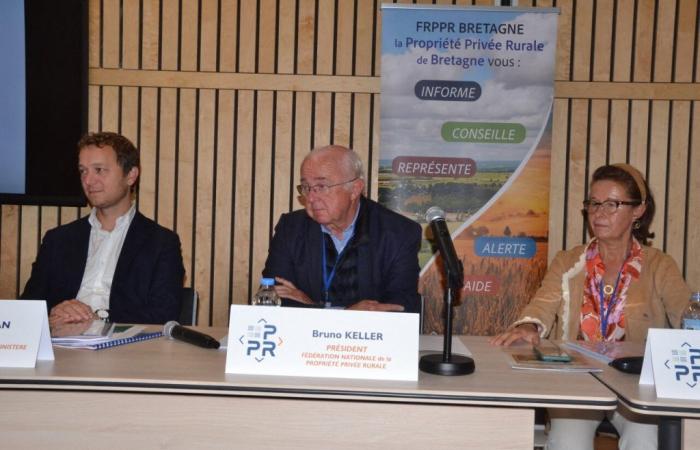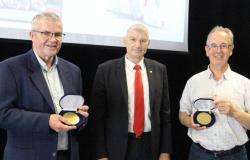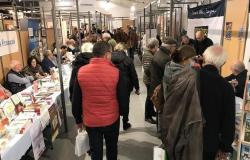Par
Chantal Pape
Published on
Oct. 4, 2024 at 6:00 p.m.
See my news
Follow Terra
“10 million hectares will change hands in the next 10 years,” recalls Hélène Beau de Kerguern, president of the PPR, the private rural property of Finistère. If this figure is national, and includes retirements farmers and sale or transmission from the owners, it does not fail to challenge and served as a common thread at the general assembly of the departmental union, on September 27 in Quimper. “Private rural owners want stay in control ».
A chance to restructure
Rather than a cause for concern, Jean-Hervé Caugant, the president of the Finistère Chamber of Agriculture, wants to see in this change of hands a chance for Brittany. “This is the first time since the post-war period that we will have the capacity to restructure land”.
Anticipate
“These changes of hands are anticipated.” Lawyer from the Drouot firm, Marie Mandeville advises owners to take advantage of this to carry out a legal audit. “The transfer of land or a farm is not managed in the same way. And tools exist, such as contracts derogating from the rental status. You have to organize yourself according to its objectives : thus, the creation of a society will make things easier.”
Share your projects
Landowners are also faced with rrevisions of PLU and PLUI, local municipal or intercommunal town planning plans “Go see the mayor of your municipality”, advises Laure Halna du Fretay, lawyer specializing in town planning law. “The communities are not obliged to inform you of the change in classification of your plots. It’s up to you to take the step, to go and share your projects, such as the construction of a building for example, which will no longer be authorized in certain sectors.” Without forgetting to give a document to the elected official at the end of the interview. “The writings remain.”
Restrictive zoning
“When revising PLUs or PLUIs, days of consultation are planned. And the owners can also share their comments,” recalls Jean-Hervé Caugant, before denouncing zoning sometimes adopted without consultation and “a sneaky control of the environment”, which can be counterproductive. “ A cover excessive can be harmful. And to cite the example of hedges, which some would like to see protected. ” It is ecological stupidity : trees are born, grow and die.
An opinion shared by Jean-Alain Divanac’h, the president of the FDSEA, about catchment protections. “Some communities tend to broaden the protection perimeter. The costs are phenomenal. And the dispossessed owners.”
Zero net artificialization? Hazard !
La ZAN, zero net artificialization, will also impact rural owners and farmers. “The first objective is to achieve a halving of the artificialization of land between 2021 and 2031, compared to the period 2011-2021,” recalls Laure Halna du Fretay. An objective to which Maël de Calan, president of the departmental council of Finistère, does not completely subscribe. “I am attached to the preservation of land. But in a country that is developing and wants to reindustrialize, it seems complicated.” And to denounce deadlines that do not seem to him not “acceptable : at the current rate, we will no longer be able to issue building permits from 2026-2027.” A situation “which would threaten the department », and a file that he hopes to see come back to the forefront at the time of the presidential elections, in order to obtain modifications.
A charter for living better together
If the land changes hands, the built properties Also. “New arrivals in rural areas must realize that economic activity was there before them,” insists Maël de Calan, citing “the earth on the road, the cows or chickens making noise…”.
In partnership with the Chamber of Notaries and the Chamber of Agriculture, the Department has therefore drafted a charter, submitted to buyers during real estate transactions in rural areas. “It is not legally binding. It’s just a matter of remembering what agriculture is, in order to achieve peaceful coexistence.”
Preserve rural areas
Attached to the rural environment, Maël de Calan recalled his support for hunters. “They are also there to regulate harmful species, and contribute to the preservation of rural areas. He also indicated that mobile medical homes would be set up, with doctors employed by the Department, who will travel to rural areas.
AI to better detect fires
The general assembly of rural private property was also an opportunity for the president of the Department to take stock of the protection of the territory facing fires. “We “rearmed” the firefighters,” explains Maël de Calan, citing the water bomber helicopter stationed in Finistère during the summer or the high-precision cameras deployed in strategic sectors. “Thanks to artificial intelligence, they are able to distinguish a fire from a barbecue, and to trigger emergency services very quickly.”
THE response times are therefore significantly reduced, a few minutes when it took an hour at the time of the major fires of 2022, in the Monts d’Arrée. “With this equipment, 2,000 ha would probably not have burned.” And the president took the opportunity to ask landowners to maintain their property andavoid wastelands, “easy prey to fires”. In order to facilitate this maintenance, the Department will acquire the vacated areas in the Monts d’Arrée, around Yeun Elez or Tuchenn Kador.
To be continued, next week, the opinion of agricultural unions on land management
Follow all the news from your favorite cities and media by subscribing to Mon Actu.






